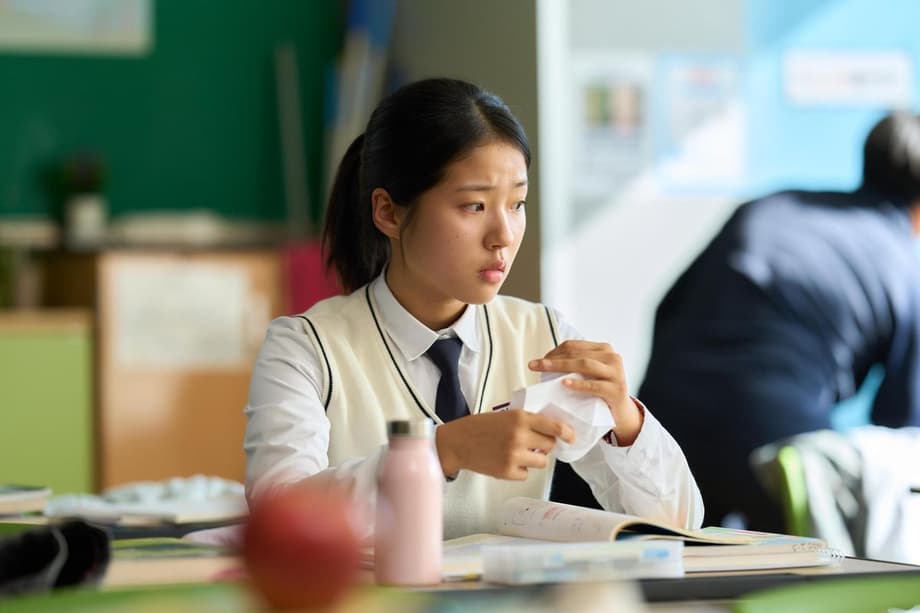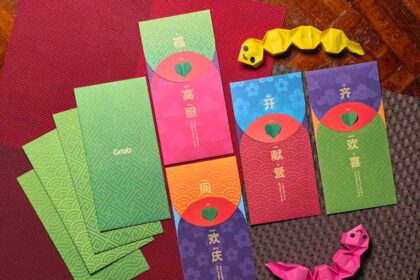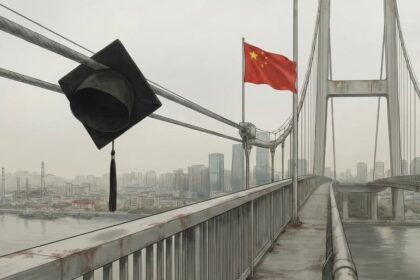A film about resilience catches fire in a restricted market
A quiet independent drama from South Korea is making unexpected noise in China. The World of Love, directed by Yoon Ga eun, has drawn strong viewer enthusiasm on Chinese social platforms and movie forums, despite years of limited access to Korean films. The feature opened in South Korean theaters in late October and has traveled through major festivals, where buzz and early reviews helped prime interest. On Douban, a leading film and book rating site in China, the movie has a high score near 9 out of 10 and more than twenty thousand users have added it to their watchlists. That level of early engagement is rare for a Korean title in the current environment.
The story follows Jooin, a spirited teenager whose daily routines are disrupted as the film gradually reveals a painful event from her past. Rather than focusing on the crime itself, the narrative observes how she lives with what happened and how people around her react. The film questions the labels that often get attached to survivors and shows how those labels can shape, and sometimes restrict, the responses that society expects.
Festival honors have fueled the surge. The World of Love won two major prizes at the ninth Pingyao International Film Festival in China, landing the Roberto Rossellini Awards Jury Prize and the People’s Choice Award. It has screened at the Hong Kong Asian Film Festival, Warsaw Film Festival and other stops on the fall circuit after its world premiere in Toronto.
In a rare development, the film has secured a Chinese distributor. Light Films Limited, a specialist in arthouse and festival titles, acquired rights to release the movie in China. If it reaches theaters, it would join a very short list of Korean features that have played in Chinese cinemas in recent years.
What the film says and how it tells it
Yoon Ga eun’s approach is direct and sensitive. The camera stays close to Jooin, allowing everyday moments to carry weight without replaying scenes of violence. The focus is on choice, agency and the small decisions that help someone reclaim ordinary life after a shock. Dialogue is spare, emotions simmer under the surface, and the film trusts audiences to read glances and silences.
The performances anchor that restraint. Seo Su bin, in a breakout turn as Jooin, balances bravado and vulnerability. A raw breakdown in a car wash stands as the emotional peak, revealing an interior life that feels both messy and true. Jang Hye jin brings warmth and conflict as Jooin’s mother, a parent trying to protect a child while learning to hear her on her own terms.
What the title really means
The English title suggests romance, but the Korean title points in another direction. It can be understood as owner of the world or master of the world, and it plays on the sound of Jooin’s name. The phrasing captures the film’s core idea, that a young person can claim ownership over her story. Love, in this frame, is less about romance and more about care, dignity and the right to define oneself.
Why Chinese audiences are responding
Conversation in China has centered on the film’s refusal to box a survivor into a single identity. Many viewers say the story resonates with situations in which classmates, coworkers or even family members rush to judge how a person should react to harm. The quiet power of the movie, and its refusal to sensationalize, have been praised as respectful and honest.
Rebecca Wu, a Chinese doctoral student in Seoul, said the film made her reconsider how people talk about survivors. Wu argued that some common phrases can trap those who have been harmed inside a narrative they did not choose.
When we say “sexual violence has destroyed the victims, leaving their lives and futures shattered,” we unintentionally trap them in a narrative of permanent victimhood.
Wang Yixue, an office worker from Shenzhen who saw the film in Hong Kong, said the movie avoids replaying the attack and instead observes how someone lives with the aftermath. She said that its perspective can lift people up.
It can encourage and empower survivors.
This response helps explain the strong Douban score and the bookmark numbers. Viewers are finding value in a portrait of recovery that allows for anger, humor and missteps. The movie shows a survivor who is not defined by what happened, and that is striking a chord.
A rare route into Chinese theaters
Light Films Limited has built its brand on thoughtful international cinema, and its acquisition of The World of Love marks an unusual opening for a Korean film in China. The company’s chief executive, Li Na, said the movie’s tone and perspective shaped the decision.
The perspective of this feminist film is refreshingly new. While it explores trauma and its lasting impact, its underlying tone is warm and uplifting, which makes it all the more moving and encouraging.
The release path is still uncertain. Since 2016, when South Korea accepted the U.S. Terminal High Altitude Area Defense system (THAAD), Korean entertainment in China has faced an unofficial freeze. Chinese regulators require foreign films to pass a content review and approval, and a quota limits how many imported titles can screen each year. Only a handful of Korean films have received official theatrical play since 2016. One recent example is the comedy Oh! My Gran, which opened in 2021 and was embraced for its gentle family themes.
Industry workers in Beijing say they are hopeful yet cautious. Skye Zhang, who works in the movie business, welcomed the news of a Chinese distributor while noting that approval and reach still depend on regulators and market conditions.
If it is eventually not nationwide released in China, I might go watch the movie in select cities where it is screened.
Are cultural ties warming again
There are small signs of movement in cultural exchange. Some fan meetings for Korean pop stars have been approved since last year, even as large stadium concerts remain off the calendar. During a recent state visit to Korea, Chinese President Xi Jinping spoke with Park Jin young, the head of JYP Entertainment and of a presidential commission on cultural exchanges. The encounter sparked new hope that the long standing freeze on Korean pop culture could ease, although concrete policy shifts have yet to follow.
Festival momentum and regional deals
Beyond China, The World of Love has built a strong festival profile. It premiered in the Platform section at the Toronto International Film Festival in early September, then won both the Rossellini Jury Prize and the People’s Choice Award at Pingyao. It continued to gather acclaim, including the Fipresci critics prize at the Warsaw Film Festival, and played at the Hong Kong Asian Film Festival, BFI London and other major showcases. This run has introduced the film to programmers, critics and audiences across regions.
Distribution agreements are expanding its footprint. Renowned Japanese distributor Bitters End has acquired rights for Japan. Edko Films is handling Hong Kong, and Taiwan’s Andrews Film will release the title there. The film is produced by Semosi and Vol Media, with Barunson E&A, the South Korean studio behind Parasite and Cobweb, serving as presenting studio and sales agent. For an independent drama without big franchise hooks, this network of releases is an achievement in itself.
What success would mean
For Korean cinema, a strong overseas response adds momentum at a time when the domestic market has been looking for steady bright spots. The World of Love posted an impressive start at home for a low budget title, selling more than thirty thousand tickets in its first five days, and has continued to draw specialty audiences. By early November, admissions in Korea passed ninety thousand, a healthy mark for an indie drama that relies on word of mouth and festival attention rather than a broad marketing push.
For Chinese viewers, a release, even if limited, would matter for reasons that go beyond a single film. It would give art house audiences access to a contemporary Korean story told with care, and it could motivate distributors to look for more works that focus on empathy, dignity and the everyday process of healing. The film’s approach rejects spectacle in favor of small shifts in mood and understanding, and that approach is connecting across cultural lines.
For market watchers, the key test lies in the review pipeline and import cap. Many in the industry expect that, if approved, a targeted rollout in select cities and art house chains is the likeliest path. Such a plan would mirror how other festival favorites have reached Chinese screens. Even that scale would mark progress after several years of near silence for Korean films in mainland theaters.
Key Points
- The World of Love, an indie drama by Yoon Ga eun, is earning strong buzz on Chinese platforms and a high Douban score near 9 out of 10.
- The film follows a teenager, Jooin, who learns to live with a past trauma, focusing on agency and everyday recovery rather than replaying violence.
- It won the Rossellini Jury Prize and the People’s Choice Award at the Pingyao International Film Festival and continued through major fall festivals.
- Chinese distributor Light Films Limited acquired the title, creating a rare pathway for a Korean film in China.
- China’s unofficial hallyu freeze since 2016, plus strict content reviews and import quotas, still pose hurdles to a wide release.
- Viewer voices in China praise the film’s empathy and its ability to encourage and empower survivors.
- Small signs of cultural thaw include approvals for some Korean pop fan events and a recent conversation between President Xi and JYP’s Park Jin young.
- Regional distribution is set in Japan, Hong Kong and Taiwan, while the film continues to draw specialty audiences in South Korea.












